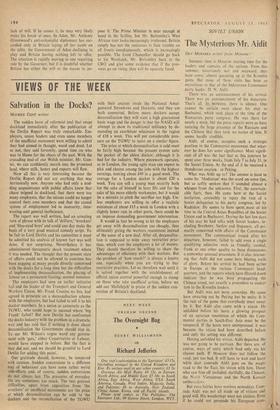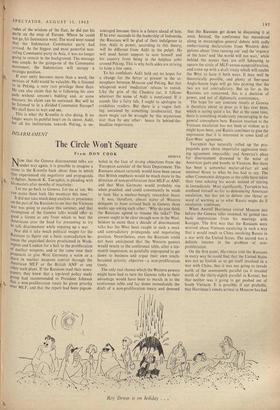SOVIET UNION
The Mysterious Mr. Aidit
DEV MURARKA writes from Moscow:
Summer time is Moscow visiting time for the leaders and captains of the nations. Even this summer, notoriously wet and wayward, they have come, almost queueing up at the Kremlin gates. But none of these visits has been so mysterious as that of the Indonesian Communist party leader, D. N. Aidit.
There was an announcement of his arrival. There was an announcement of his departure. That's all. In between, there is silence. One cannot be certain even about his visit to Bucharest, which took place at the time of the Rumanian party congress. He was there for nearly a week, but the press reports were so busy noticing the large presence of the Russians and the Chinese that they took no notice of him. It seems hardly credible.
Aidit, of course, occupies such a strategic position in the Communist movement that what- ever he does has some significance. Most signifi- cant of all was the fact that at this juncture he spent over three weeks, from July 7 to July 31, in the Soviet Union. At the end of it he received a thunderous ovation: in Peking.
What was Aidit up to? The answer is hard to come by. `Mediation' was the word on some lips, but so softly spoken that it sounded almost a whisper from the unknown. First, the ascertain- able facts, then. He came here at the Soviet invitation, ostensibly to repay the visit of a Soviet delegation to his party congress, led by Rashidov. He seems to have spent, most of his time in the Central Asian Republics of the Soviet Union and in Bucharest. During the last few days of his stay he had talks with Soviet leaders, in- cluding Brezhnev, Suslov and Stepanov, all pri- marily concerned with affairs of the Communist movement. The communiqué issued after his departure, however, failed to add even a single qualifying adjective such as friendly, cordial, frank or any other quality to these discussions, a somewhat unusual procedure. It is also interest- ing that Aidit did not come here blazing trails of glory. Before his arrival he had been active in Europe at the various Communist head- quarters, and the reports which have filtered down indicate that he was busy propagating the Chinese creed, not exactly a procedure to endear him to the Kremlin leaders, But Aidit was not born yesterday. He came here swearing not by Peking but by unity. It is the rule of the game that everybody must swear by it. But Aidit also came with a vision. He unfolded before his hosts a glowing prospect of an agrarian revolution of which the Com- munist parties in South-East Asia must be the vanguard. If the hosts were unimpressed, it was because the vision had been described before and only the setting was different.
Having unfolded his vision, Aidit departed. He was not going to be partisan. But there are, of course, ways of unity which lead only via his chosen path. If Moscow does not follow the road, just too bad. It will have to wait and learn while dear comrade Aidit goes on the magic road to the the East, his vision with him. Those who saw him off included, dutifully, the Chinese, the North Vietnamese and the North Korean ambas,..dors.
But even fairies have motives nowadays. Com- rade Aidit was not all made up of visions and good will. His wanderings were not aimless. Even if he could not persuade his European corn-
rades of the wisdom of the East, he did put his party on the map of Europe. Where he could not go, his lieutenants went. The word went round that the Indonesian Communist party had arrived. As the biggest and most powerful non- ruling Communist party in Asia, it was no longer going to remain in the background. The message was simple. In the goings-on of the Communist movement, the Indonesians will occupy a strategic position.
If ever unity becomes more than a word, the services of Aidit,could be valuable. He is listened to in Peking, a very rare privilege these days. He can also claim that he is following his own Path without anyone's bidding • and, in some measure, his claim can be sustained. But will he be listened to in a divided Communist Europe? We shall have to wait and see.
This is what the Kremlin is also doing. It no longer wears its painful heart on its sleeve. Aidit, for all his inclinations towards Peking, is en- couraged because there is a future ahead of him. If he ever succeeds to the leadership of Indonesia, the Russians will be glad of their indulgence to him. Aidit in power, according to this theory, will be different from Aidit in the pulpit. He will need Soviet support to save himself and his country from being in the helpless orbit around Peking. This is why both sides are striving to keep a line open.
To his confidants Aidit held out no hopes for a change for the better at present in the at- mosphere between Moscow and Peking. But that whispered word 'mediation' refuses to vanish. Like the grin of the Cheshire cat, it follows wherever the name of Aidit is mentioned. If it sounds like a fairy tale, I ought to apologise to credulous readers. But there is a vague feel- ing, sustained by something insubstantial, that more magic can be wrought by this mysterious visit than by any other: hence its behind-the- headline importance.































 Previous page
Previous page